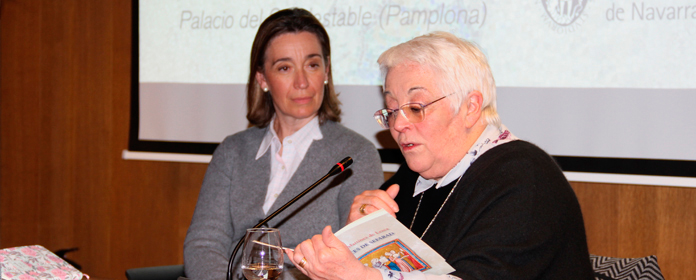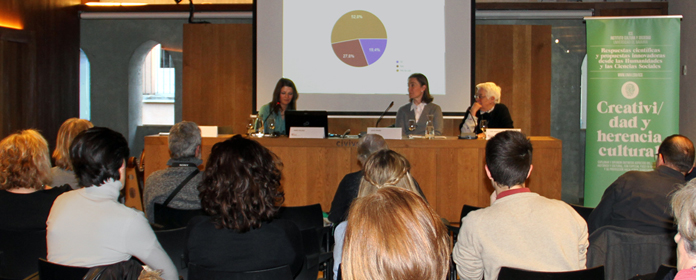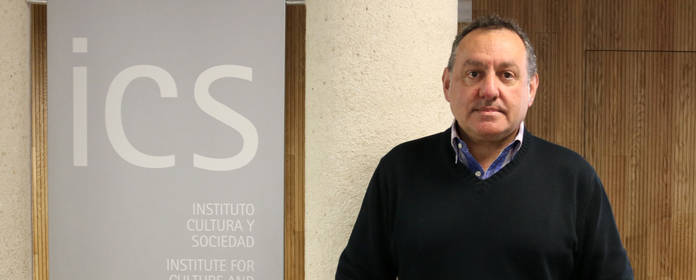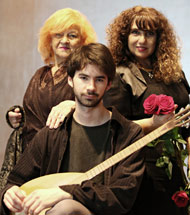"Women of all ages have struggled to survive, fulfill their dreams and leave their bequest to the next generations."
The writer Toti Martínez de Lezea participated in the III workshop Sefarad of Institute for Culture and Society, where she presented a book of stories about Sephardic women of the Sephardic Age. average

PHOTO: Natalia Rouzaut
With La calle de la judería, the writer Toti Martínez de Lezea made her debut as a novelist in 1998. That degree scroll was followed by others that have placed her among the essential authors of historical novels in Spanish language -and also in Basque-, such as La abadesa, La herbolera or La sombra del templo.
Her most recent book, Voces de sefarad, gathers several stories about Sephardic women in medieval Spain, one of them set in the Jewish quarter of (Estella) Navarra. She presented it at the framework of the 3rd Sepharad workshop , which was held this year under the title degree scroll 'Sepharad imagined and represented' (literature and documentary cinema in women). The initiative was organized by the project 'Creativity and Cultural Heritage' of the Institute for Culture and Society (ICS) of the University of Navarra.
-How has literature treated the Sephardim? Has it helped us to better understand this part of our past and, in some way, to break stereotypes?
There is very little, if any, literature concerning the Sephardim. There is about European Jews, and more specifically about the dramas experienced by these communities in the 20th century. In any case, you only have to read Shakespeare's play The Merchant of Venice to see in the character of Shylock the prejudices against Jews that existed in the past. I wouldn't know how to answer your second question, I would like to think so, but it is difficult to break stereotypes anchored in the subconscious, and even less so through the novel, taking into account the low reading rates.
-What about today's prejudices? Anti-Semitism is growing in Europe? Can bringing the Jewish past closer to society through literature be a weapon to fight it?
Unfortunately it is so; it is a fact that takes place from time to time based, now as in the past, on clichés very far from reality. I do not believe that Literature is a weapon, but rather it can be a means, another vision. The Sephardim are part of our past, of our history, but there are still people who identify them with curved-nosed usurers, when in fact the vast majority were neither rich nor moneylenders; the Jewish Europeans were artisans, merchants, doctors, poets; also farmers and needy poor, like the rest of the population.
- In the book you have presented, 'Voices of Sepharad', the protagonists are women. What is the common thread among the women you portray? What do they have in common?
In general there is not much documentation with proper names of medieval women, Christian, Jewish or Muslim, unless they are not queens, saints and some others, so these stories are totally imagined. However, I have taken advantage of each historical era in which I place these narratives, customs, laws, habitat, religion, what little is known about them, to recall them in some way. They have in common what most women of any creed have in common: the desire to better themselves in hostile societies, full of prejudices, where it was very difficult to have their own personality.
- In your novels you draw courageous female characters, who sometimes defy the society in which they live.... What do your characters teach today's women?
Well, not all my female characters are brave; there are also cowards, submissive, bad mothers and even a couple of murderers, but yes, there are several very strong ones. The idea is not to teach but to show a reality, to remember that, just as today and despite being practically disappeared from history, women of all times have struggled to survive, to raise their sons and daughters, to fulfill their dreams and to leave their bequest to the following generations.
- Many of your works are set in the late Middle Ages average. What would you like to emphasize about this period of history?
That it attracts me enormously and that, despite the great plagues, the endless wars, the climatic conditions that caused death and misery, it is a time of inventions such as the printing press or.... glasses; of commercial exchanges and finding from distant countries, creation of public libraries and standardization of universities, as well as magnificent painters, musicians, sculptors or builders who established the instructions later used by Renaissance artists, to mention just a few aspects of that period.
- How do you manage to put yourself in the shoes of characters from times so far removed from the present, with other values and references?
I have read, and I read, many essays and articles in specialized magazines from all over subject, I visit places, museums... It is not enough to imagine a plot; the characters and events have to be credible, have specific characteristics depending on the times and places where the action takes place; they have to work, talk, act, eat, give birth, die.... My characters are generally ordinary people, not documented, but there are laws, judgments, contracts, mentions, which help to recreate the moment. On the other hand, basically human beings have not changed; our hopes, ambitions or fears are the same now as in other centuries. The rest is hypothesis and imagination.
- As a leading author of historical novels, can you explain why they are so popular, and why readers of different generations connect so well with the past?
I suppose it's due to the desire to know where we came from, and not everyone is in the mood to read an academic text. In my particular case, my father was a great reader of historical essays, and he introduced me to history at a very young age. When I wrote my first novel, I could not think of any other genre, as this is the one I enjoy the most, and the one most present in universal literature. However, under the heading of "historical novel" there are many works that either have nothing to do with history, or have little to do with literature. It is not a question of making a king or a pope, conqueror or saint speak, but of creating a literary plot; and, on the other hand, it is necessary to limit oneself to what is credible, not to invent the implausible in order to make it look pretty. It is necessary to document thoroughly to write a novel that takes place in a past not lived by the author, and keep in mind that the good reader of this genre is much more critical and demanding than the reader of any other.




